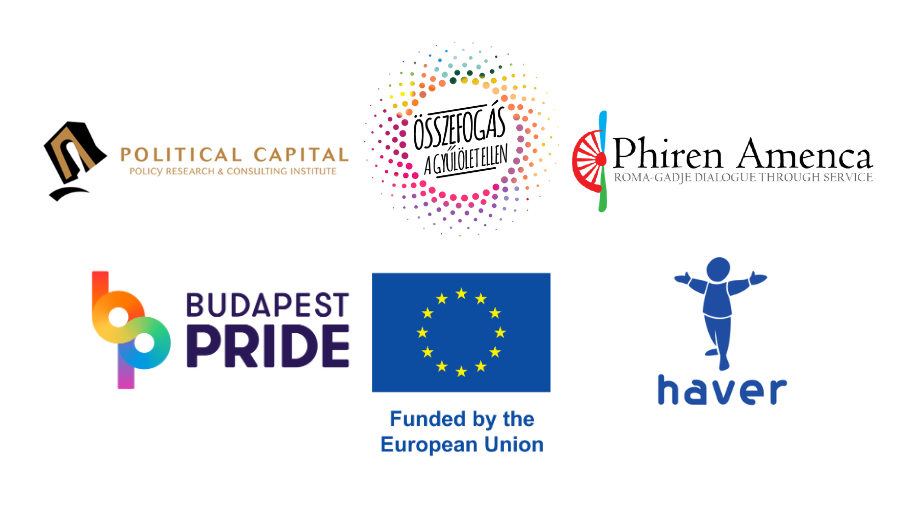November 3. 2022, Budapest
Participants:
Budapest Pride: Diószegi Judit, Radványi Viki
Political Capital: Kelen Zsuzsi, Hunyadi Bulcsú
RGDTS: Daróczi Anna
Haver: Dés Julcsi, Kolozs Andrea
The meeting started with a welcome, the outlining of the schedule and a short round of participants’ motivations to take part in the meeting. It was followed by a presentation compiled by the communications officer of Budapest Pride.
The presentation showcased some successful examples of different campaigns connected to combatting online hate speech:
An initiative of UNICEF and “Kék vonal” called #nemvagyegyedul or #youarenotalone which targeted the victims of cyberbullying through social media platforms and involved online influencers in 2020.
Another example was done by Háttér Táraság called #hangosabbagyuloletnel or #louderthanhate. It encouraged victims of anti-LGBTQ+ hate crimes to report the incidents the experienced. The had a landing page where the complaints could be made and which could be accessed form social media. They also did onsite awareness raising events on the streets of Budapest. The result of the project was an international report and a conference.
The target groups of the No Hate Speech Movement’s and Subjective Values Foundation’s campaign was much wider, the general population, but more particularly teachers, school psychologists, principles, people in teachers’ training and social workers. They also used social media and a landing website where they offered one-day workshops and disseminated a toolkit on how to tackle hate speech.
A non-Hungarian example was the Speak out online campaign explaining in videos and infographics how to report online harassing content.
Finally, a publication of RGDTS was presented titled “Combating online hate speech against religious groups and various vulnerable minority groups” from 2022 which contained three articles about hate scpeech legislation, online hate speech monitoring with AI, and the role of non-governmental actors in combatting online hate. This was disseminated online and offline.
The commonalities in all these initiatives were the following:
- Target group: teachers, psychologists, victims and “people in power”
- They all used Facebook and Instagram to spread their message and had landing pages with advice and further sources
- Most of the projects had concrete outputs in the form of toolkits and research publications.
After the presentation and evaluation of past initiatives, all organizations were asked to list their constituencies’ profiles and the groups they had access to on post-it notes. Budapest Pride can easily reach out to young people affected by anti LGBTQ+ hate speech as well as their supporters; Political Capital has a reachout to progressive youth, and would like to target journalists as well as people who “do” hate speech, but do not know about it. Haver’s target groups are high school and university students and young people between 15 and 25 years of age. RGDTS has access to Roma young people online. The team concluded that the group we can reach out to with the campaign are young people between 15-25 who are members or supportive of minority groups, and journalists.
The next part of the discussion covered the potential goals of our future campaign, and concluded that the following information, call and goals are needed:
- What to do when one witnesses hate speech online
- Pressure social media platforms to create better evaluation policies
- Encourage bystanders to act
- Panel sentences to use to counter hateful contents
- Suggest victims to build supportive communities who can stand up for them
- Ask supporters to act, comment
The project communications team agreed that in the coming weeks, all organisations would compile a list of influencers who are followed by their target groups/communities; and that a survey will be created by Budapest Pride, and circulated by all organisations in order to assess the patterns of media consumption of our constituencies, based on which the messages and channels will be finalized.

The „CHAD – Countering Hate Speech and Hurtful Speech against Diversity: Roma, LGBTIQ, Jewish and Migrant Communities” project (project nr. 101049309) is funded by the Citizens, Equality, Rights and Values Programme (CERV) of the DG Justice, European Commission and coordinated by RGDTS Nonprofit Llc. in partnership with Haver Informal Educational Foundation, Rainbow Mission Foundation and Political Capital. Views and opinions expressed are however those of the author(s) only and do not necessarily reflect those of the European Union or the Citizens, Equality, Rights and Values Programme. Neither the European Union nor the granting authority can be held responsible for them.


